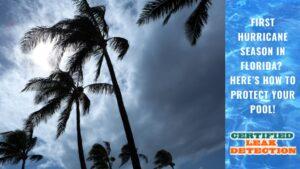
The Sunshine State has welcomed many new residents recently! If you are among them and purchased a home with a pool to make the most of the good life in Central Florida, you may be wondering what you should do to protect it from the high winds and torrential sustained rains of a hurricane. Not to put a damper on the summer fun you’re expecting, but hurricane season – which runs from June 1 through November 30 – does require making preparations and taking precautions to protect your property as much as possible.
Also, keep in mind that tropical storms and Florida’s afternoon summer thunderstorms can pack a destructive punch. In any case, it’s better to be proactive and prepared than trying to batten down the hatches when a hurricane is on the way! The following tips are from our blog posts – “What You Need to Know About Protecting Your Pool During Hurricane Season” – and “How to Protect Your Pool During Hurricane Season” – as well as advice from Florida Swimming Pool Association (FSPA), In the Swim and River Pools
Be Prepared! Make a Hurricane Plan for Your Yard and Patio!
Walk around your property and take a detailed assessment of which items need to be moved indoors or secured in place, then make a plan of how to do so. Make note of any loose items that could be picked up or hurled by strong winds and become projectiles that crash through windows. Decide where these items should be moved in the event of a hurricane warning, which means that a hurricane is expected to hit your area.
Items that need to be moved typically include patio furniture, barbecue grill/smoker, toys, plants in containers, etc. You can bring a gas grill indoors, but leave the propane tank outside, chained in an upright position to a solid object or structure. However, if you can’t bring free-standing furniture into the house or garage/shed, don’t put it in the pool, as it could damage the interior finish – especially with a vinyl liner pool. Instead, tie the items down to keep them from blowing into the pool.
Again, taking the time to plan now will prevent the stress of scrambling to protect your pool, windows and screen enclosure (see next tip) should a hurricane or tropical storm (which has sustained winds of 39 to 73 miles per hour and may or may not become a hurricane) head your way!
Prevent Hurricane Damage to the Screen Enclosure
Screen pool enclosures are also vulnerable. Some damage to the frame of a screen structure may be prevented if you provide a “vent” for wind to flow through. Consider removing screen panels on opposite sides of the enclosure by pulling out the vinyl spine that holds the panels.
Otherwise, apply the same advice regarding bringing items that can be hurled by hurricane-force winds to a safe place indoors. Considering that a category 1 hurricane packs sustained winds of 74 to 95 mph, a screen enclosure offers little or no protection to anything inside. The screen panels and even frames themselves can be damaged by patio furniture thrown against them.
Essential Steps for Protecting Your Pool and its Electronics from Hurricanes
Don’t cover the pool – Although it may seem a logical way to prevent debris from being dumped in, it’s easier to remove branches and other items afterward than replacing an expensive pool cover that’s been damaged by the same.
Balance the water chemistry – Test your pool water and add chemicals as needed to balance it out. This will give you a head start when cleaning the water after the storm has passed. If you want, you can shock the pool – that is, superchlorinate with algaecide – for an extra boost against dirt and germs that the storm will throw into the water.
Don’t drain the pool – Do not drain your pool before the storm – or ever! Draining a pool can cause it to bulge, split or pop out of the ground. The only time you should need to drain your pool is when it requires a major repair, and that should always be done by a professional. Our blog post – “Why You Should Never Drain Your Pool Yourself” – covers this topic in greater detail.
Don’t throw patio furniture into the pool unless as a last resort – If it is necessary to do so, gently place these items into the pool to prevent possible damage to the interior finish and remove as soon as possible to avoid staining. Never place glass items in the pool. Skimmer lids should be screwed in place to avoid flying off.
Pool electronics are typically safe from the elements under normal weather conditions, but the extreme, prolonged high winds and heavy rains of a hurricane are the exception. Take the following precautions once a hurricane or tropical storm is projected for your area:
- Power down your equipment at the circuit breaker. This includes your pump, lighting, chlorinator and all other electric equipment. The likelihood of them getting damaged or overworked is high.
- Wrap your pump, automatic timer, heater and light fixtures in a few layers of plastic. Use duct tape and rope to secure the wrapping in place. If possible, physically disconnect power to the devices.
Hurricane preparations for above-ground pools are similar to those for in-ground pools:
- Don’t drain the pool.
- Turn off power and tie down or remove equipment.
- Remove the pool cover and balance the chemicals.
Our Wish for a Quiet Hurricane Season
Our team at Certified Leak Detection hopes for a quiet and uneventful 2023 hurricane season. While we do not perform swimming pool maintenance or repair, we want you, your pool and your property to be protected and safe! We look after all of your leak-related issues, be it your swimming pool, spa or fountain. We serve areas throughout Central Florida, including Orlando, Longwood, Lake Mary, Sanford, Kissimmee, Clermont and Winter Springs. Contact us for quick and reliable service.

